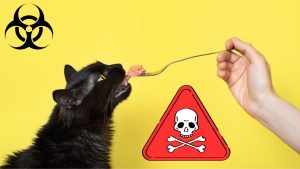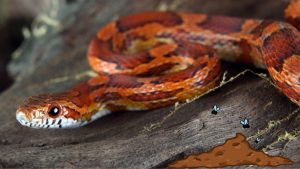As a cat owner, you want to ensure that your furry friend stays healthy and happy. A crucial aspect of maintaining your cat’s health is understanding their nutritional needs and what foods to avoid. Some human foods that are safe for us can be toxic to cats, so it’s important to be aware of what to avoid.
Common foods toxic to cats include onions, garlic, and chives, which can cause damage to your cat’s red blood cells. Chocolate, caffeine, and alcohol are also harmful to cats and can cause vomiting, diarrhea, and even seizures. Additionally, some fruits like grapes and raisins can cause kidney failure in cats. Knowing what foods to avoid can help prevent your cat from getting sick and ensure they live a long and healthy life.
Key Takeaways
- Understanding your cat’s nutritional needs and what foods to avoid is crucial for maintaining their health.
- Common foods toxic to cats include onions, garlic, chocolate, caffeine, and alcohol.
- Symptoms of food poisoning in cats can include vomiting, diarrhea, and seizures, and it’s important to contact animal poison control if you suspect your cat has ingested something toxic.
Understanding Cat Nutrition
As a responsible cat owner, it’s important to understand the nutritional needs of your feline friend. Cats are obligate carnivores, which means that they require a diet rich in animal protein to thrive. Unlike humans and dogs, cats cannot produce certain essential nutrients like taurine and arachidonic acid on their own, so it’s crucial that these nutrients are included in their diet.
Protein is a critical component of a cat’s diet. It provides the building blocks for strong muscles, healthy skin and coat, and a robust immune system. Cats require a high-quality, animal-based protein source to meet their nutritional needs. Look for cat food that lists a specific animal protein source, such as chicken or salmon, as the first ingredient.
Taurine is another essential nutrient for cats. It plays a crucial role in maintaining healthy vision, heart function, and reproductive health. Cats cannot produce taurine on their own, so it must be included in their diet. Look for cat food that includes taurine on the ingredient list.
Arachidonic acid is an omega-6 fatty acid that is essential for cats. It plays a vital role in maintaining healthy skin and coat, as well as supporting reproductive health. Cats cannot produce arachidonic acid on their own, so it must be included in their diet. Look for cat food that includes a source of arachidonic acid, such as chicken fat or fish oil.
It’s essential to feed your cat a well-balanced diet that meets their nutritional needs. Avoid feeding your cat table scraps or human food, as many foods that are safe for humans can be toxic to cats. Consult with your veterinarian to determine the best diet for your cat based on their age, health status, and activity level.
Common Foods Toxic to Cats
If you’re a cat owner, you know how curious and mischievous cats can be. They love to explore and sometimes, that curiosity can lead to them eating things that are harmful to their health. As a responsible pet owner, it’s important to be aware of the common foods that are toxic to cats.
Chocolate and Coffee
Chocolate and coffee contain a compound called theobromine, which is toxic to cats. Even a small amount of chocolate or coffee can cause vomiting, diarrhea, and hyperactivity in cats. In severe cases, it can lead to seizures and even death.
Alcohol
Alcohol can cause serious problems in pets, including vomiting, diarrhea, breathing difficulties, coma, and death. Keep all alcoholic beverages and foods containing alcohol out of reach of your furry friend.
Onions, Garlic, Chives, Leeks, Shallots, and Scallions
All of these foods contain compounds that can damage a cat’s red blood cells, leading to anemia. Symptoms of anemia include weakness, lethargy, and pale gums.
Dairy Products
Cats can become lactose intolerant when they become adults. Their bodies no longer produce enough lactase to digest milk—especially cow’s milk. Feeding your cat dairy products can cause gastrointestinal upset, including vomiting and diarrhea.
Raw Eggs, Meat, and Fish
Raw eggs, meat, and fish can contain harmful bacteria such as Salmonella and E. coli, which can cause food poisoning in cats. Additionally, raw fish contains an enzyme that destroys thiamine, an essential B vitamin that cats need to maintain good health.
Grapes and Raisins
Grapes and raisins can cause kidney failure in cats. Even a small amount can be toxic and lead to vomiting, diarrhea, and lethargy.
Nuts
Some nuts, such as macadamia nuts, can cause vomiting, tremors, and hyperthermia in cats. Additionally, nuts can be a choking hazard and cause gastrointestinal blockages.
Citrus Fruits
Citrus fruits, such as oranges, lemons, and limes, contain compounds that can cause gastrointestinal upset in cats. Keep these fruits away from your furry friend.
Green Tomatoes and Potatoes
The leaves and stems of tomato and potato plants are highly toxic to cats. These plants contain solanine, which can cause vomiting, diarrhea, and lethargy.
Yeast Dough
Yeast dough can rise and cause gas to build up in your cat’s digestive system. This can lead to bloating, abdominal pain, and vomiting.
Dog Food
While it may seem harmless, feeding your cat dog food can be harmful to their health. Dog food is formulated differently than cat food and lacks the essential nutrients that cats need to maintain good health.
Remember, if you suspect that your cat has ingested a toxic substance, contact your veterinarian immediately. Time is of the essence when it comes to treating poisoning in cats.
Symptoms of Food Poisoning in Cats
If your cat has eaten something toxic, it is important to recognize the symptoms of food poisoning as soon as possible. Here are some common symptoms to look out for:
Digestive Upset
One of the most common symptoms of food poisoning in cats is digestive upset. This can include vomiting, diarrhea, abdominal discomfort, and increased thirst and urination. If your cat is experiencing any of these symptoms, it is important to monitor them closely and seek veterinary care if the symptoms persist or worsen.
Neurological Problems
Some toxic foods can cause neurological problems in cats. These can include seizures, tremors, disorientation, and trouble breathing. If your cat is experiencing any of these symptoms, it is important to seek veterinary care immediately.
Abnormal Heart Rhythm
Certain toxic foods can cause an abnormal heart rhythm in cats. This can lead to lethargy, weakness, and even coma or death if left untreated. If you notice any signs of an abnormal heart rhythm in your cat, such as rapid breathing or a weak pulse, seek veterinary care immediately.
Increased Thirst and Urination
If your cat has eaten something toxic, they may experience increased thirst and urination. This can be a sign of kidney failure, which can be life-threatening if left untreated. If you notice your cat drinking more water than usual or having accidents outside of the litter box, seek veterinary care immediately.
In conclusion, it is important to recognize the symptoms of food poisoning in cats as soon as possible. If you suspect your cat has eaten something toxic, seek veterinary care immediately. By being aware of the symptoms and taking action quickly, you can help ensure your cat’s health and well-being.
Special Considerations
Holiday Hazards
During the holiday season, it is important to keep your cat away from certain foods that can be dangerous for them. Some common holiday foods that can be toxic to cats include chocolate, onions, garlic, grapes, raisins, and alcohol. Make sure to keep these foods out of reach of your cat or locked away in a secure area.
Canned Tuna and Mercury Poisoning
While cats love the taste of tuna, it is important to feed it to them in moderation. Canned tuna can contain high levels of mercury, which can lead to mercury poisoning in cats if consumed in large amounts. Symptoms of mercury poisoning in cats include loss of coordination, vomiting, and seizures. If you suspect your cat has consumed too much tuna, contact your veterinarian immediately.
Vitamin A Toxicity
While vitamin A is an essential nutrient for cats, too much of it can be toxic. Vitamin A toxicity can occur when cats consume large amounts of liver, which is high in vitamin A. Symptoms of vitamin A toxicity in cats include loss of appetite, weight loss, and bone deformities. If you suspect your cat has consumed too much vitamin A, contact your veterinarian immediately.
Obesity and Overfeeding
Overfeeding your cat can lead to obesity, which can cause a variety of health problems such as diabetes, arthritis, and heart disease. Make sure to feed your cat a balanced diet and avoid giving them too many treats or table scraps. If you are unsure about how much to feed your cat, consult with your veterinarian.
Remember, in case of an emergency, contact your veterinarian or an animal poison control center immediately. Avoid giving your cat any human medication, such as acetaminophen or ibuprofen, without consulting with your veterinarian first. Additionally, avoid feeding your cat avocado, as it can be toxic to them.
Contacting Animal Poison Control
If you suspect that your cat has ingested a toxic food, it is important to act quickly. The best course of action is to contact the Animal Poison Control Center (APCC) at (888) 426-4435. The APCC is staffed 24 hours a day, 365 days a year by veterinary toxicologists who can provide expert advice on what to do next.
When you call the APCC, be prepared to provide the following information:
- Your name, phone number, and location
- Your cat’s breed, age, and weight
- The name of the toxic food your cat ate, and how much they ate
- The time when your cat ate the toxic food
- Any symptoms your cat is experiencing
Based on this information, the veterinary toxicologist will be able to determine whether your cat needs to be seen by a veterinarian, and what treatment may be necessary. In some cases, the APCC may be able to provide advice on how to manage the situation at home, without the need for a veterinary visit.
It is important to note that there may be a consultation fee for calling the APCC. However, this fee is well worth it to ensure that your cat receives prompt, expert care in the event of a toxic food ingestion.
In addition to contacting the APCC, it is also a good idea to keep your veterinarian’s phone number handy in case of emergencies. Your veterinarian can provide guidance on what to do next, and can work with the APCC to ensure that your cat receives the best possible care.
Frequently Asked Questions
What human foods are toxic to cats?
There are many human foods that are toxic to cats. Some of the most common ones include onions, garlic, and chives, as well as chocolate, alcohol, grapes, and raisins. Other foods that can be dangerous for cats include raw eggs and meat, as well as dairy products.
What should you do if your cat eats something toxic?
If you suspect that your cat has eaten something toxic, you should contact your veterinarian immediately. In some cases, your veterinarian may recommend that you induce vomiting in your cat, but this should only be done under their guidance.
Can cats eat chocolate?
No, cats should not eat chocolate. Chocolate contains a substance called theobromine, which can be toxic to cats in large amounts. Even small amounts of chocolate can cause vomiting, diarrhea, and other symptoms in cats.
Are grapes and raisins toxic to cats?
Yes, grapes and raisins can be toxic to cats. They can cause kidney failure in some cats, and even small amounts can be dangerous. If you suspect that your cat has eaten grapes or raisins, you should contact your veterinarian immediately.
Can cats eat onions or garlic?
No, cats should not eat onions or garlic. These foods can damage a cat’s red blood cells, which can lead to anemia. Even small amounts of onions or garlic can be dangerous for cats.
What are the symptoms of poisoning in cats?
The symptoms of poisoning in cats can vary depending on the type of toxin involved. Some common symptoms include vomiting, diarrhea, lethargy, loss of appetite, and difficulty breathing. If you suspect that your cat has been poisoned, you should contact your veterinarian immediately.
Author
-

Jess is a lifelong pet lover, known for her profound passion for animals. With a wide range of pets, from cats and dogs to fish and hamsters, she has experienced the joys and challenges of pet ownership firsthand. Her writing captures the unique bond between humans and pets, sharing heartwarming anecdotes and practical advice. Jess’s deep understanding of animal behavior and commitment to responsible pet care make her a valuable resource for fellow pet enthusiasts. Through her words, she continues to inspire and educate, fostering meaningful connections between humans and their beloved furry companions.








